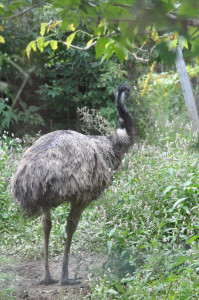 Feedstock: Sunflowers, soybeans and canola
Feedstock: Sunflowers, soybeans and canola
Fuel: Biodiesel
Co-products: High-protein sunflower meal as feed ingredient
Energy Output: Power (for farm machinery) and heat (for farmhouse)
Services: Oilseed Grower, Oil milling, Feed Supply
Owner: Larry Scott and Peggy Hewes
Location: Newbury, Vermont
Larry Scott and Peggy Hewes operate Ekolott Farm—a diversified farm raising emus, Herefords, and hogs, and growing feed and energy crops such as shell corn, sunflowers, and soybeans on 200 acres of Connecticut River valley land. Ekolott produces biodiesel to fuel a portion of their tractor work, all of their own heat and an increasing amount of the feed ingredients for their animals, including grains and sunflower seed meal.
Ekolott is a three-generation dairy farm that moved to Vermont from Massachusetts in 1980. The farm consistently achieved Vermont milk quality awards with their 220 registered Holsteins, until the cows were sold in 2004.
Diversification of the farm had already begun in 1994 when the Scott family began raising emus (they are currently the largest and one of the oldest emu farms in Vermont, under the name Riverside Emus). With barns and pasture freed up after the dairy herd was sold, the Scott-Hewes took on raising Herefords and hogs and have been developing a local customer base for their beef, pork, and emu through on-farm and farmers’ market sales.Growing Their Own Fuel And Feed
With a long-term goal to operate farm equipment and heat farmhouses with biodiesel from oilseeds produced on the farm, Ekolott has been growing soybeans, sunflowers, and canola, while building the infrastructure and knowledge for drying, storing, and processing these crops into biodiesel.
Ekolott Farm was awarded two VSJF – Vermont Bioenergy Initiative matching grants between 2008 and 2013, for research and demonstration, totaling $47,000. Areas of research included establishing sunflower and soybean trials and comparing yields at varying seeding rates, testing planting and harvest times to reduce crop loss to birds and deer and tracking labor and energy costs. They also gathered comparative agronomic and economic data on organic and conventional methods of oilseed crop production and processing. On the demonstration side, the farm purchased a 1987 John Deere 6620 Titan 2 combine, a tine weeder to reduce herbicide spraying and a Täby Model 70 double-oilpress similar to the one at State Line Farm. With the Täby, The Scott-Hewes can process about a 1/2 ton of sunflower seeds over a 24-hour period. Currently, they do not have a biodiesel processor at the farm, but contract with a neighbor who owns a BioPro190.
This project has helped confirm guidelines for growing sunflowers on the farm. Oilseeds grow well in Ekolott Farm’s rich soil, but bringing home good yields has proved challenging. For one, says Scott, “much of our cropland lies in the Connecticut River flood plain, and severe flooding has been increasingly common in the last decade. This means we may not be able to count on as many viable acres for sunflowers as we originally hoped.” There have also been a variety of pest pressures , especially the recent arrival of the banded sunflower moth and heavy losses from deer. Ekolott Farm has always used conventional agricultural methods, but as a result of this project the Scott-Hewes are now asking themselves, “…do we transition to lower usage of herbicide and fertilizer inputs? And can we maintain a comparable (or better) yield?”




